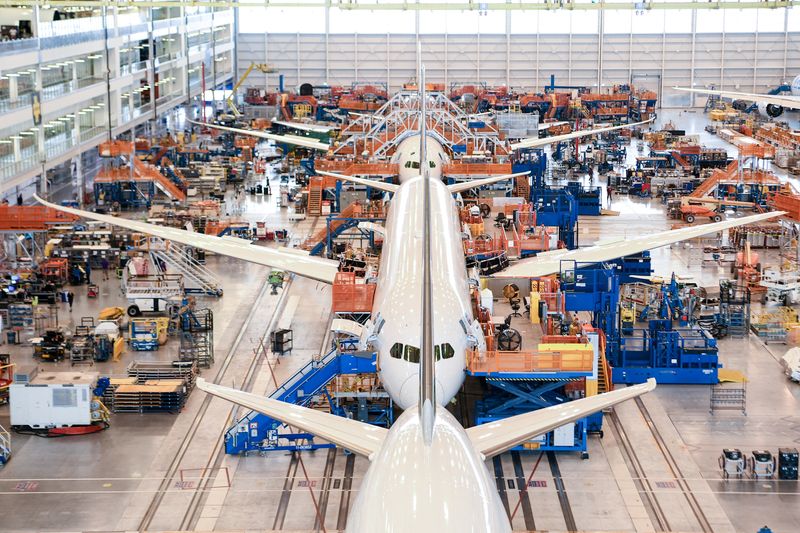By David Shepardson and Allison Lampert
WASHINGTON (Reuters) -The U.S. Federal Aviation Administration (FAA) is investigating a Boeing (NYSE:BA) whistleblower's claims that the company dismissed safety and quality concerns in the production of the planemaker's 787 and 777 jets, an agency spokesperson said on Tuesday.
The planemaker has been grappling with a full-blown safety crisis that has undermined its reputation following a Jan. 5 mid-air panel blowout on a 737 MAX plane. It has undergone a management shakeup, U.S. regulators have put curbs on its production, and deliveries fell by half in March.
Boeing engineer Sam Salehpour's allegations stem from work on the company's widebody 787 and 777 jets. He said he faced retaliation, such as threats and exclusion from meetings, after he identified engineering problems that affected the structural integrity of the jets, and claimed Boeing employed shortcuts to reduce bottlenecks during 787 assembly, his attorneys said.
Boeing halted deliveries of the 787 widebody jet for more than a year until August 2022 as the FAA investigated quality problems and manufacturing flaws.
In 2021, Boeing said some 787 airplanes had shims that were not the proper size and some aircraft had areas that did not meet skin-flatness specifications. A shim is a thin piece of material used to fill tiny gaps in a manufactured product.
In a statement, Boeing said it was fully confident in the 787 Dreamliner, adding that the claims "are inaccurate and do not represent the comprehensive work Boeing has done to ensure the quality and long-term safety of the aircraft."
Salehpour observed shortcuts used by Boeing to reduce bottlenecks during the 787 assembly process that placed "excessive stress on major airplane joints, and embedded drilling debris between key joints on more than 1,000 planes," his lawyers said.
He told reporters in a call later on Tuesday that he saw problems with misalignment in the production of the 777 widebody jet which were remedied by using force.
"I literally saw people jumping on the pieces of the airplane to get them to align," he said.
Boeing shares closed down nearly 2% at $178.12 on Tuesday after the FAA confirmed the investigation, which was first reported by the New York Times.
"Voluntary reporting without fear of reprisal is a critical component in aviation safety," the FAA said. "We strongly encourage everyone in the aviation industry to share information. We thoroughly investigate all reports."
An agency source said the FAA has met with the whistleblower.
The Society of Professional Engineering Employees in Aerospace (SPEEA) said Salehpour is a member who works at Boeing's plant in Everett, Washington. The engineering union said it could not comment on Salehpour's specific concerns.
SENATE HEARING
U.S. Senator Richard Blumenthal's office said his investigation subcommittee will hold a hearing on Boeing issues with Salehpour on April 17 titled "Examining Boeing's Broken Safety Culture: Firsthand Accounts."
Blumenthal added he wants Boeing CEO Dave Calhoun, who said last month that he will step down by year-end, to testify at a future hearing. The panel had initially sought to have Calhoun testify at next week's hearing according to a March 19 letter.
"We want to provide Boeing the opportunity to explain to the American people why, in light of recent apparent safety failures, the public should feel confident in Boeing's engineering and assembly processes," Blumenthal and Senator Ron Johnson, the top Republican on the panel, wrote.
Boeing has offered to provide documents, testimony and technical briefings to the senate sub-committee, the company said in an emailed statement to Reuters on Tuesday.
Salehpour has provided documentation to the FAA that will be made available at the hearing, his lawyers said. In a Jan. 19 letter to FAA Administrator Michael Whitaker, the lawyers said Salehpour made these observations while working on the 787 program in 2021.
"Rather than heeding his warnings, Boeing prioritized getting the planes to market as quickly as possible, despite the known, well-substantiated issues he raised," attorneys Debra Katz and Lisa Banks said in a statement on Tuesday.
Whitaker has taken a hard line on Boeing since the Jan. 5 Alaska Air (NYSE:ALK) emergency, barring the planemaker from expanding 737 MAX production, and requiring it to develop a comprehensive plan to address "systemic quality-control issues" within 90 days.
Separately, the U.S. Department of Justice is investigating whether Boeing violated a 2021 settlement that shielded the U.S. planemaker from prosecution following two fatal MAX crashes in 2018 and 2019. That January 2021 agreement, known as a deferred prosecution agreement (DPA), gave the planemaker an avenue to avoid prosecution on a charge of conspiring to defraud the FAA.

In determining whether Boeing violated the settlement, prosecutors are expected to lean heavily on findings from the FAA's investigations, a person familiar with the matter previously told Reuters.
The FAA in August 2022 approved the first Boeing 787 Dreamliner for delivery since 2021 after the manufacturer made inspection and retrofit changes needed to meet certification standards. There are currently about 1,100 Dreamliners in service, Boeing said.